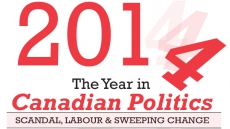GUELPH, Ont. — Interfering with a citizen's right to vote merits real jail time, an Ontario judge declared Wednesday as he made Michael Sona the first person ever to spend time behind bars for violating the Canada Elections Act.
Sona, the former Conservative staffer convicted in the 2011 robocalls scandal, was sentenced to nine months behind bars and one year's probation for what Justice Gary Hearn called "an affront to the electoral process."
He's the first person convicted of wilfully preventing or endeavouring to prevent an elector from voting under the Canada Elections Act, said Hearn, who called his task "a difficult and troublesome sentencing."
Hearn said he believes Sona did not act alone in the scheme, in which some 6,700 automated phone calls were placed on the morning of the 2011 federal election with misleading information on how to vote.
Sona was just 22 at the time of the offence, lacked proper guidance from more experienced colleagues, and has suffered emotionally in the aftermath, Hearn acknowledged.
But jail time was nonetheless warranted in order to send the unmistakable message — particularly to those involved in politics — that messing with the electoral process is a serious crime, he said.
"This was a deliberate and considered course of criminal conduct specifically designed to subvert the inherent fairness of the electoral process," Hearn told the court.
"This was a federal election undertaken to elect representatives who form the governing body in our nation. This was not an amateurish Grade 8 election campaign for student council. Conduct such as that of Mr. Sona is not suitable at any time."
Sona hung his head and fiddled with his BlackBerry, his family members beside him in tears, as Hearn delivered his fate. He was later led out of the courtroom by police.
Sona's lawyer, Norm Boxall, said his client would be transferred to an unspecified provincial jail. He said a decision has not yet been made whether to file an appeal.
"He's obviously disappointed with the decision, but he's strong," Boxall said outside court.
"He will be considering all of his options in the upcoming days, and those decisions are best made when persons can reflect calmly and logically and not do them in the emotional aftermath of a decision."
Boxall said Sona would likely consult with another lawyer to determine whether an appeal is appropriate. He could then seek a release from jail pending his appeal. Should he decide not to appeal, he could be eligible to apply for parole after three months, Boxall said.
In a statement issued through a friend and posted to Twitter, Sona continued to plead his innocence.
"I had no involvement in the fraudulent phone calls," the statement said.
"Furthermore, although I have suspicions based on media reports I've read, as other Canadians do, I have no (personal) knowledge who on the ... campaign was responsible for these fraudulent phone calls."
Sona is a youthful, first-time offender, but that couldn't be allowed to overshadow the seriousness of the case, Hearn said. Given his background, he presumably supported the right of people to a free and fair vote, he continued.
"He took very active steps to see that this did not happen and the sentence must be such that the serious nature of this conduct is made apparent to those similarly inclined."
Hearn said he did recognize that Sona had already suffered considerably, noting periods of stress and depression; he also said Sona had taken "rather drastic steps" to deal with those problems "in a very inappropriate manner."
Boxall refused to elaborate.
Although the Crown and defence agreed he likely did not act alone, Sona was the only person charged in the scheme. He had been facing a maximum penalty of five years in jail and a $5,000 fine.
Boxall had asked for a suspended sentence or a six-to-12-month conditional sentence with house arrest, parole and a requirement for community service.
Ruth McGuirl of the Public Prosecution Service of Canada applauded Hearn's sentence.
"The trial judge sent out a message today that the type of conduct which interferes with the fundamental rights of voters warrants jail time," McGuirl said.
"It is (hoped) that this sentence will send a message which will deter anyone who would like to participate in any kind of similar conduct."





